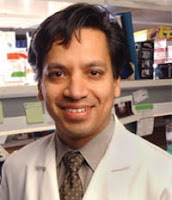What controls the way we behave? Our guest this week, Dr. Cornelia Bargmann, hopes to answer this complicated question. She explains how our biology, our genes, and the environment we live in can affect the way we behave. She is especially interested in understanding social behaviors, or how animals interact with each other. In her research, she uses the humble worm, known as c. elegans, to study the underlying biology that can switch an individual from being a loner to a party animal, and vice versa.
Cori is a professor at The Rockefeller University and an investigator of the Howard Hughes Medical Institute. She has recently been featured in the Charlie Rose Brain Series and The New York Times.
For an additional teaching resource, check out the lesson plan we created to accompany this episode.
More on the Bargmann Lab's research
Hosted by Osama Ahmed
June 30, 2012
June 03, 2012
Regenerating the heart: Deepak Srivastava
Heart disease is the number one cause of death in men and women, and congenital heart defects affect about 1 out of every 100 babies worldwide. Our guest, Dr. Deepak Srivastava, a professor of pediatrics and the director of the Gladstone Institute of Cardiovascular Disease at UCSF, is focused on changing that statistic.
By studying how stem cells in the developing embryo transform into heart cells, Dr. Srivastava hopes to find out what causes children to be born with heart abnormalities. Additionally, by understanding how nature develops healthy heart cells, research in the Srivastava lab may soon lead to new therapies for patients with heart disease. His lab has already found a way to guide non-muscle cells in the heart into fully functional, beating muscle cells in mice. He hopes to move these strategies into clinical human studies in the future.
At the end of our talk, Dr. Srivastava gives his most important advice for an aspiring, young scientist.
More on the Srivastava Lab's research
Hosted by Karuna Meda
By studying how stem cells in the developing embryo transform into heart cells, Dr. Srivastava hopes to find out what causes children to be born with heart abnormalities. Additionally, by understanding how nature develops healthy heart cells, research in the Srivastava lab may soon lead to new therapies for patients with heart disease. His lab has already found a way to guide non-muscle cells in the heart into fully functional, beating muscle cells in mice. He hopes to move these strategies into clinical human studies in the future.
At the end of our talk, Dr. Srivastava gives his most important advice for an aspiring, young scientist.
More on the Srivastava Lab's research
Hosted by Karuna Meda
Subscribe to:
Comments (Atom)

